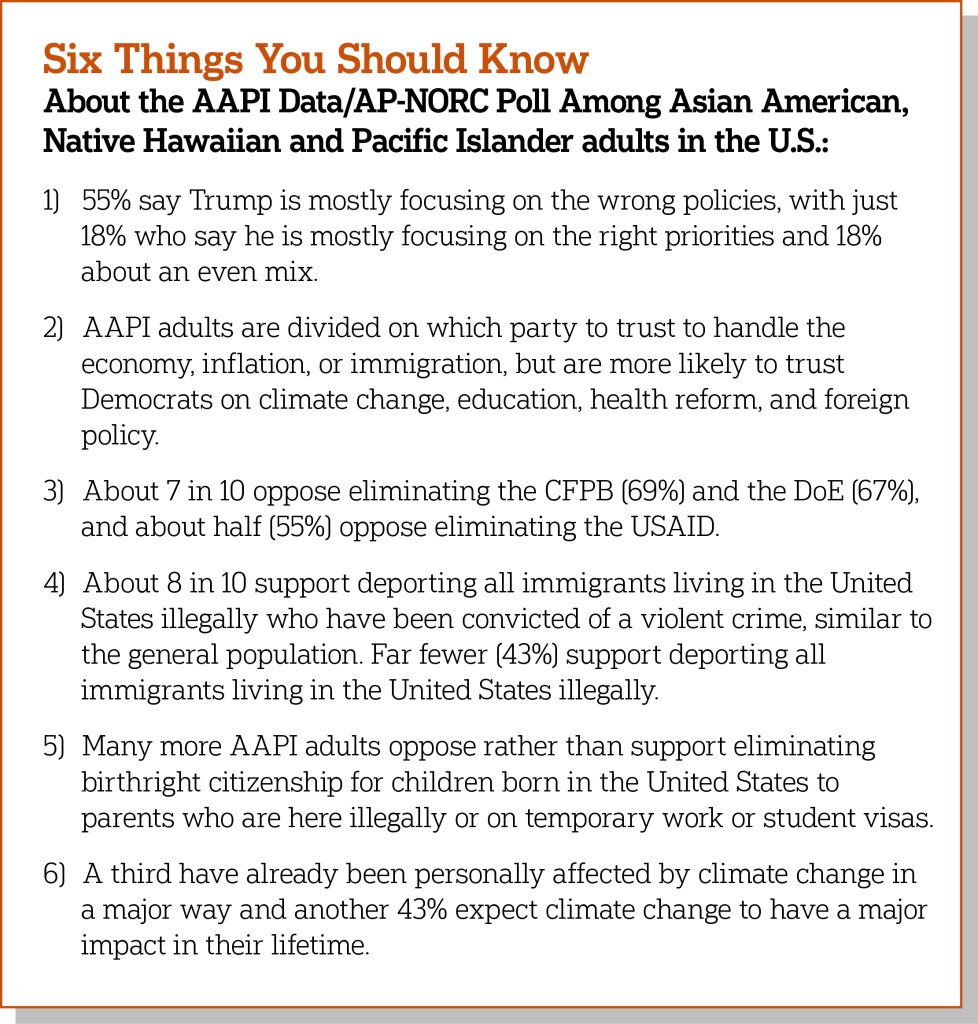
April 9, 2025
As the Trump administration continues to enact its agenda, a new AAPI Data/AP-NORC Poll finds many AAPI adults disapprove of how President Trump is handling a host of key policy issues, including the economy and trade (71%), managing the federal government (68%), and government spending (63%). AAPI adults are more likely to express disapproval on each of these issues than the general population, according to a March 2025 AP-NORC Poll.
About half (55%) say Trump is mostly focusing on the wrong policies, while just 18% say he is mostly focusing on the right priorities.
A majority (76%) agree that Elon Musk, the head of the new Department of Government Efficiency (DOGE), has too much influence on the U.S. federal government and are largely opposed to the cuts to federal agencies that DOGE has either made or proposed. About 7 in 10 oppose eliminating the Consumer Financial Protection Bureau (CFPB) (69%) and the Department of Education (DoE) (67%), while about half (55%) oppose eliminating the U.S. Agency for International Development (USAID).
AAPI adults are opposed to federal cuts to diversity and equity programs. Two-thirds oppose eliminating initiatives that seek to broaden access to federal resources, policies, and programs for Asian Americans and Pacific Islanders, and that eliminate federal funding to K-12 schools that teach about the ongoing impact of slavery and racism in America.
And, similar to the general public, about half (51%) oppose eliminating the debt ceiling, a limit set by lawmakers that determines how much the federal government can borrow to pay its existing bills.
Although AAPI adults are opposed to many Trump administration’s policies, they are divided on which party they trust to do a better job handling key issue areas such as the economy, inflation, and immigration. On other matters, however, the Democratic party has a clear advantage. Democrats are more trusted than Republicans when it comes to climate change (56% vs 15%), education (50% vs 19%), health reform (45% vs 18%), and foreign policy (42% vs 25%).
AAPI adults and the general population are largely in line when it comes to views on immigration and policies addressing those living the United States illegally. Forty-three percent of AAPI adults support deporting all immigrants living in the United States illegally. However, just 20% of adults aged 18-29 support this policy, compared to 36% of adults aged 30-44 and about half of those aged 45 and older.
Context also matters for AAPI opinion on deportation policies. About 8 in 10 adults among both AAPI and general population support deporting all immigrants living in the United States illegally who have been convicted of a violent crime. About 9 in 10 AAPI adults aged 45 and older support this policy, compared with two-thirds of adults age 18-29.
Support is lower when it comes to certain tactics for arresting people. Just 27% support these deportations if it means they will be separated from their children who are citizens. About half of AAPI adults oppose arresting people who are in the country illegally while they are in the hospital or at church or other places of worship. These views are nearly identical to those of the general population.
The Trump administration has proposed limitations on birthright citizenship. Only a quarter of AAPI adults support eliminating birthright citizenship for children born in the United States to parents who are here on a temporary work or student visa (24%), while about half oppose (56%). Similarly, about a third of AAPI adults support eliminating birthright citizenship for children born to immigrants who are here illegally (32%), while 50% oppose. On the matter of legal immigration, half oppose reducing the number of family-sponsored visas available for immigrants living in the country legally to bring their relatives to the United States or reducing the number of temporary work visas, such as H-1B visas, available for foreign workers.
Similar to findings from a year ago, about 8 in 10 AAPI adults have experienced an extreme weather event in the last 5 years. Sixty-five percent have experienced extreme heat waves, 46% have experienced severe winter storms, and 32% have experienced wildfires such as the recent fires in California.
Compared with a recent poll among the general population, AAPI adults are more likely to say that climate change has had or will have a major impact on their lives or health. For example, 21% say that climate change has already had a major impact on their health and 53% expect it will have major impact, while just 26% do not think it will have a major impact. Expectations are similar for the impacts of climate change on their lives overall, and air quality and water availability where they live.
And, like recent findings among the general public, there is broad support among AAPI adults for government aid in the case of natural disasters. About 6 in 10 support the federal government providing money to local residents to help them rebuild or to make their property more resistant to natural disasters and providing homeowners’ insurance in at-risk communities for people who cannot get private insurance. Fifty-one percent support restricting new construction in these at-risk communities.

The nationwide study was conducted by The AP-NORC Center for Public Affairs Research and AAPI Data from March 4–10, 2025, using the Amplify AAPI Monthly survey drawing from NORC’s Amplify AAPI® Panel designed to be representative of the U.S. Asian American, Native Hawaiian, and Pacific Islander household population. Online and telephone interviews were offered in English, the Chinese dialects of Mandarin and Cantonese, Vietnamese, and Korean with 1,182 Asian American, Native Hawaiian, and Pacific Islanders aged 18 and older living in the United States. The margin of sampling error is +/- 4.7 percentage points.



